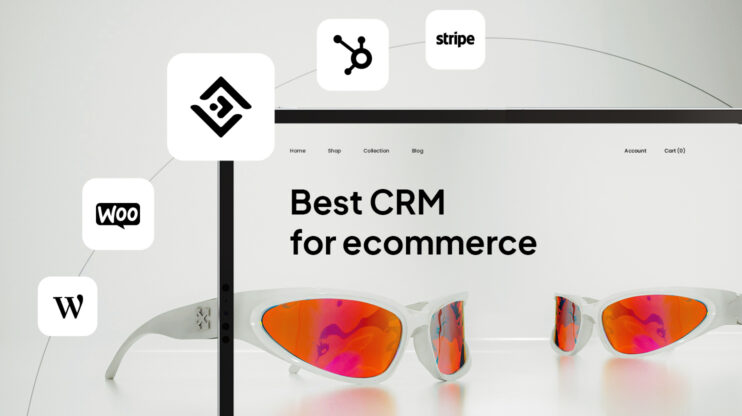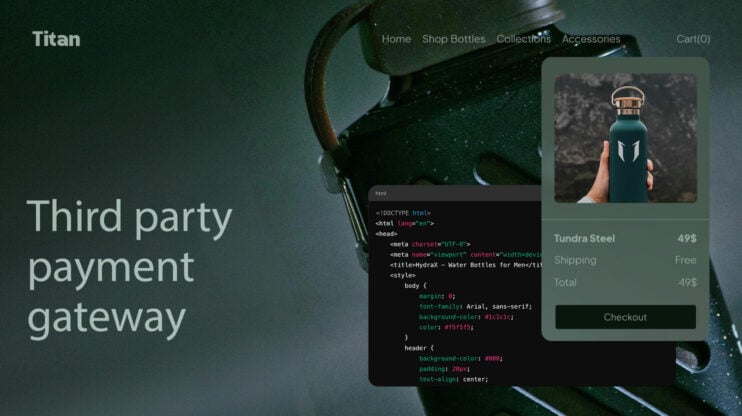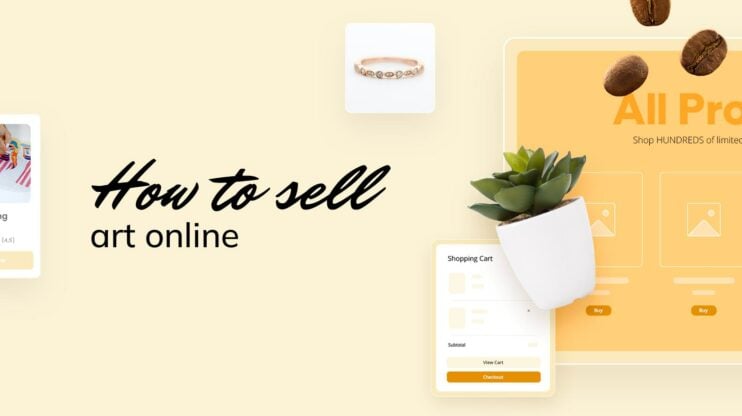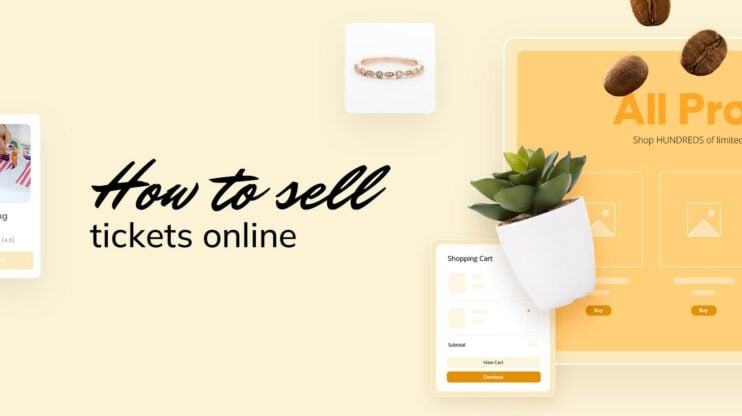Starting an online store sounds exciting, but figuring out how to find dropshipping suppliers can make or break your business. Dropshipping is appealing because it lowers upfront costs and inventory risks. But to build a profitable ecommerce store, you need trustworthy suppliers who deliver quality products on time.
This guide will walk you through how to find suppliers for dropshipping in 2025. We’ll cover key strategies, from using online directories to sourcing directly. Plus, you’ll get practical tips on how to confirm a supplier’s reliability and quality, as well as some guardrails to keep you on the right path to a successful dropshipping store.

Create your online store in minutes!
Looking to sell online? Develop and launch your store with 10Web AI Ecommerce Website Builder.
What is a dropshipping supplier? What do they do?
A dropshipping supplier stores, packs, and ships products directly to your customers. Your role is to market and sell while they handle logistics. Choosing the right supplier is crucial. They directly impact your store’s reputation and customer satisfaction.
Different suppliers for a range of products, prices, and regions
- Manufacturers: Produce items directly. Finding manufacturers for dropshipping is ideal for bulk orders and customization but may require higher minimum order quantities (MOQs).
- Wholesalers: Buy from manufacturers and sell in smaller quantities. Good for variety without the large MOQs.
- Sourcing agents: Help find reliable suppliers and handle negotiations. This is great for reducing risks when dealing with overseas suppliers.
- Marketplaces: Platforms like AliExpress and Amazon offer access to many suppliers but vary in quality and shipping speed.
- Aggregators: Tools like Spocket and Modalyst connect you to vetted suppliers for a subscription fee.
- Domestic suppliers: Local companies offer faster shipping but can be pricier.
- Overseas suppliers: Cheaper but may involve longer shipping times and language barriers.
The best dropshipping suppliers share key aspects
- Shipping speed: Customers expect fast delivery, and delays harm your reputation.
- Product quality: Low-quality items lead to refunds and bad reviews.
- Inventory stability: Frequent stockouts frustrate buyers.
- Clear communication: You need prompt, clear responses to issues.
- Brand reputation: A supplier’s mistake becomes your problem—choose wisely.
When searching for dropshipping suppliers, prioritize those with a proven track record of reliability. Doing your homework upfront can help you avoid headaches, keep your customers happy, and achieve your business goals.

Create your online store in minutes!
Looking to sell online? Develop and launch your store with 10Web AI Ecommerce Website Builder.
How to find dropshipping suppliers the right way
Finding reliable suppliers for dropshipping takes time and effort, but the following methods can help you identify trustworthy partners.
1. Use supplier directory platforms
Supplier directories are the most obvious choice for researching suppliers. These online databases help you find pre-screened wholesalers and manufacturers. They save time by consolidating multiple suppliers into one place, making your search a lot more efficient.
Popular directories:
- SaleHoo: Access to 8,000+ vetted suppliers, best for beginners.
- Spocket: Focuses on US and EU suppliers for faster shipping.
- Doba: Combines product sourcing with inventory management.
- Worldwide Brands: Lifetime access to a massive supplier list (membership required).
Pros:
- Suppliers are usually vetted for legitimacy.
- You can search by product category or region.
- Some directories offer tools to compare suppliers.
Cons:
- Most require a subscription fee.
- Not every supplier on the list may offer dropshipping.
Before committing to a directory, check if they offer a trial or a refund policy. This way, you can test the platform without too much risk.
2. Browse marketplaces
Marketplaces are websites where many suppliers list their products. They’re convenient because you can browse, compare, and contact suppliers directly. However, the quality and reliability of suppliers can vary significantly, so due diligence is essential. Always order samples before adding products to your store. A supplier may look great online but fail to deliver on quality or speed.
Popular marketplaces:
- AliExpress: A go-to for affordable products from China.
- Amazon and eBay: Great for finding US-based suppliers or resellers.
- DHgate: Similar to AliExpress but often with bulk pricing.
Pros:
- Huge range of products and suppliers.
- Easy to compare prices and reviews.
- No subscription fee. Pay only when you buy.
Cons:
- Quality and shipping times can vary.
- Risk of counterfeit or low-quality products.
- Communication can be challenging with overseas sellers.
3. Source directly (research, referrals, and trade shows)
Sometimes, the most reliable suppliers aren’t listed on major platforms. In these cases, direct sourcing can give you a competitive edge. Look for virtual trade shows or webinars if attending in person isn’t feasible. Many suppliers have adapted to online events, making it easier to network remotely.
- Research: Start with a list of products you want to sell. Search online for keywords like “[product name] wholesale” or “[product name] manufacturer.” Look for company websites rather than just marketplace listings.
- Referrals: Join dropshipping communities on Reddit, Facebook groups, or dedicated forums. Experienced sellers often share their favorite suppliers or sourcing tips. You can also network with other store owners to exchange insights.
- Trade Shows: Attend industry-specific trade shows or expos. Meeting suppliers in person builds stronger relationships and lets you see products firsthand. You can discuss shipping terms, quality standards, and even negotiate better deals.
Pros:
- Builds more personal and trustworthy relationships.
- You can directly assess product quality at trade shows.
- Finding unique or niche products is often easier.
Cons:
- Requires more effort and time.
- Travel expenses if attending trade shows.
- Vetting suppliers without platform support can be challenging.
Finding the right dropshipping supplier isn’t a one-size-fits-all process. Combining multiple methods gives you the best chance of finding reliable partners. Moving on, we’ve got some bookmarkable sites where you can put these methods to the test.
13 sources to find suppliers for dropshipping in 2025
We selected these dropshipping suppliers, directories, and services based on their ability to meet the most common needs of new and growing ecommerce businesses. Our list includes beginner-friendly, reliable sources offering a wide range of products, fast shipping options, and automated integrations. Wondering how to find dropshipping suppliers for niche items, print-on-demand products, or bulk orders? There’s something here for everyone.
1. Aliexpress
Best for: Beginners | Low-cost & bulk ordering | International suppliers
AliExpress is a popular platform to find suppliers for dropshipping. It offers a wide range of products from many sellers around the world, mostly based in China.
To start learning how to find suppliers on AliExpress, start by searching for products you want to sell. Sort the results by the number of orders to see popular items. This can help you spot trusted sellers, then look at their profiles carefully. Check ratings and customer feedback. Good suppliers often have high ratings and positive reviews from past buyers.
Some AliExpress sellers offer faster shipping methods, which can be better for your customers. Contact potential suppliers before ordering. Ask questions about their products, shipping, and policies. Their responses can give you a sense of how they work with dropshippers.
Remember, prices on AliExpress are usually low, but quality can vary. It’s a good idea to order samples before committing to a supplier. AliExpress can be a good starting point for new dropshippers. It’s easy to use and doesn’t require big upfront investments. But keep in mind, many other sellers might use the same suppliers.
| Pros | Cons |
| Wide product selection | Variable product quality |
| Low prices | Longer shipping times |
| Easy to start | High competition |
| No upfront costs | Less control over inventory |
2. Alibaba
Best for: Low cost & bulk ordering | International suppliers
Alibaba is a major online marketplace where you can find dropshipping suppliers. It connects you with many manufacturers and wholesalers from China and other countries.
Pricing on Alibaba is often lower than other platforms, and it offers a wide range of products. Be aware of potential shipping fees and import taxes. Alibaba is best for medium to large ecommerce stores since it offers bulk ordering options and customization features.
Key features of Alibaba include:
- Large selection of products
- Supplier verification system
- Trade Assurance program
- Communication tools for talking with suppliers
- Product customization options
When learning how to find dropshipping suppliers, Alibaba can be a valuable resource. It offers a vast network of suppliers and tools to help you source products.
| Pros | Cons |
| Low prices | Some suppliers have high MOQs |
| Wide product range | Longer shipping times |
| Supplier verification | Language barriers possible |
| Customization options | Quality can vary |
3. Spocket
Best for: Beginners | Fast shipping (US, EU) | Automation & integration
Spocket helps find dropshipping suppliers in the USA and EU. It offers integration with popular ecommerce platforms like WooCommerce, so it’s easy to add products to your store.
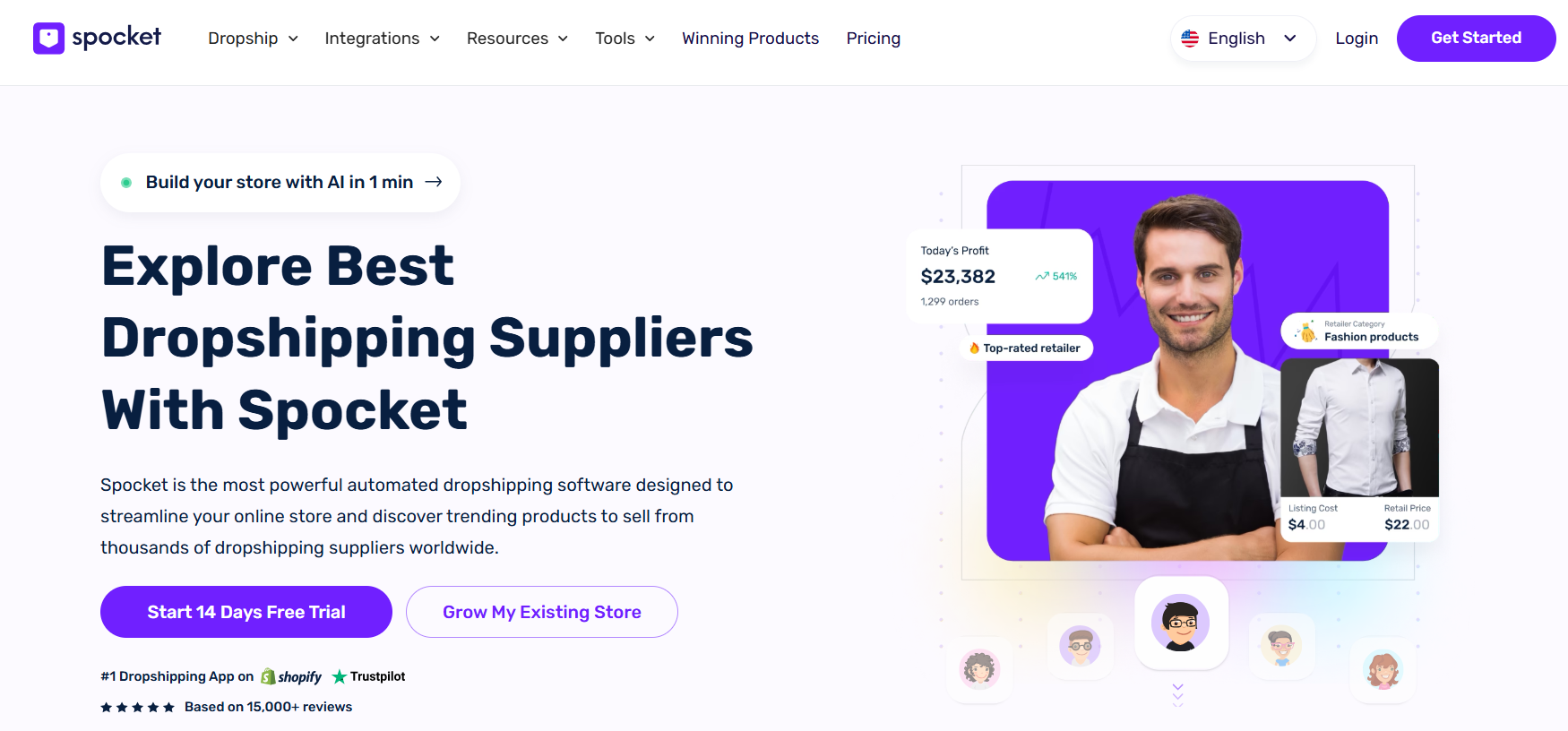
Pricing varies by product, but Spocket claims to offer margins of at least 25%. They charge a monthly fee for their service, with plans starting around $25 per month. The monthly subscription gives you access to vetted suppliers, quick order processing, and branded invoicing.
Key features:
- USA and EU supplier network
- Fast shipping times
- Product customization options
- Automated order processing
- Branded invoicing
| Pros | Cons |
| Quick shipping from US/EU suppliers | Limited product selection compared to some competitors |
| Easy integration with major ecommerce platforms | Monthly subscription fee required |
| High-quality products with good profit margins | Some features only available on higher-tier plans |
| No MOQ |
4. Doba
Best for: Beginners | Low-cost & bulk ordering | Automation & integration
Doba is a popular platform for finding dropshipping suppliers. You can use it to discover products from many different sellers in one place. This makes it easier to stock your online store without dealing with lots of separate companies. To use Doba, you’ll need to pay for a subscription. Plans start at $29 per month.
Key features of Doba include:
- Large product catalog
- Inventory tracking
- Easy integration with many ecommerce platforms
- Product data feeds
- Supplier scorecards
Doba’s a good choice if you’re new to the business and want an all-in-one dropshipping supplier.
| Pros | Cons |
| Wide range of products | Monthly subscription required |
| No minimum order quantity | Can be pricier than working directly with suppliers |
| Helpful tools for beginners | Some products may have high prices |
| No MOQ |
5. Oberlo
Best for: Beginners | International suppliers | Automation & integration
Oberlo helps find suppliers for dropshipping on Shopify stores. It helps you find products from AliExpress suppliers and add them to your online shop. You can manage orders and track shipments through the app. Pricing varies by product on AliExpress. Oberlo offers a free plan to get started. Paid plans range from $29.90 to $79.90 per month.
Key features:
- Product importer from AliExpress
- Automatic order fulfillment
- Inventory and price auto-updates
- Sales tracking dashboard
| Pros | Cons |
| Easy to use with Shopify | Limited to AliExpress suppliers |
| Low startup costs | Longer shipping times |
| Large product selection | Quality control can be tricky |
| Low MOQ |
6. Inventory Source
Best for: Fast shipping (US, EU) | Automation & integration
Inventory Source is a platform where you can find dropshipping suppliers and get help managing your inventory. It offers a wide range of products across many categories, making it easier to find items for your online store.
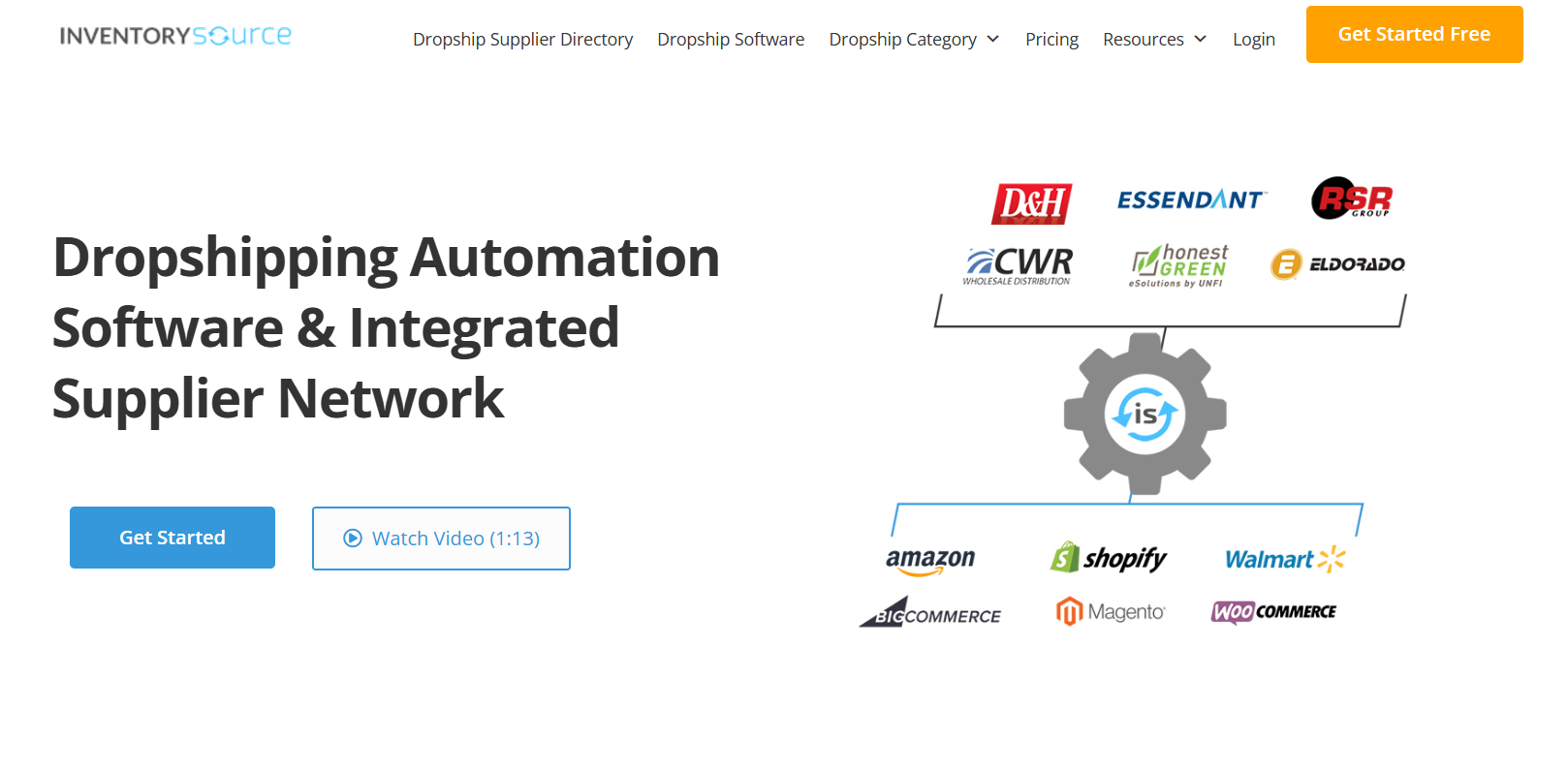
You can use Inventory Source to find dropshipping suppliers for free. The platform also has paid options offering more features. The basic plan starts at $399 per month. This gives you access to supplier integration and inventory automation.
Key features:
- Large supplier network
- Inventory automation
- Integration with many ecommerce platforms
- Product data syndication
- Order routing
Inventory Source works well for medium to large ecommerce stores. It’s especially useful if you want to automate your dropshipping processes.
| Pros | Cons |
| Wide supplier selection | Can be pricey for new sellers |
| Automated inventory updates | Learning curve for new users |
| Good integration options | Some features only in paid plans |
| MOQ varies by supplier |
7. Modalyst
Best for: Beginners | Custom products (fashion) | Fast shipping (US, EU)
Modalyst is an app that connects you with suppliers from around the world. You can find a wide range of products to sell in your dropshipping online store, including fashion, electronics, toys, and beauty items. You don’t need to store or ship products yourself. When you make a sale, the supplier sends the item directly to your customer.
Modalyst offers both free and paid plans. The free plan includes up to 25 products, while paid plans start at $35 per month for up to 250 products. There’s also a small fee per order.
Key features:
- Access to millions of products
- US and international suppliers
- Fast shipping options
- Easy product importing
- Automated price and inventory updates
| Pros | Cons |
| Large product selection | Some suppliers have long shipping times |
| Low MOQ | Quality can vary between suppliers |
| US supplier options | Extra fees on some plans |

Create your online store in minutes!
Looking to sell online? Develop and launch your store with 10Web AI Ecommerce Website Builder.
8. Wholesale2b
Best for: Beginners | Low-cost & bulk ordering | Automation & integration
Wholesale2b is a popular platform for anyone trying to learn how to find dropshipping suppliers. It offers access to over 1.5 million products from more than 100 suppliers.
It provides a free directory of dropshipping suppliers, mostly from the USA, Canada, and the UK, so you can browse and import products easily. Pricing starts at $49.99 per month for their subscription service. This includes features like automatic order fulfillment and inventory management.
Key features:
- Large product catalog
- Automated order processing
- Inventory sync
- Supplier integration
| Pros | Cons |
| Wide range of products | Monthly subscription fee |
| No MOQ | Limited to certain countries |
| Automated features | Potential for product overlap with competitors |
9. CJDropshipping
Best for: International suppliers | Low-cost & bulk ordering | Automation & integration
CJDropshipping is a supplier directory offering products at competitive prices. They source items directly from Chinese marketplaces like 1688 and Taobao. This often leads to lower costs compared to other platforms such as dropshipping suppliers on AliExpress.
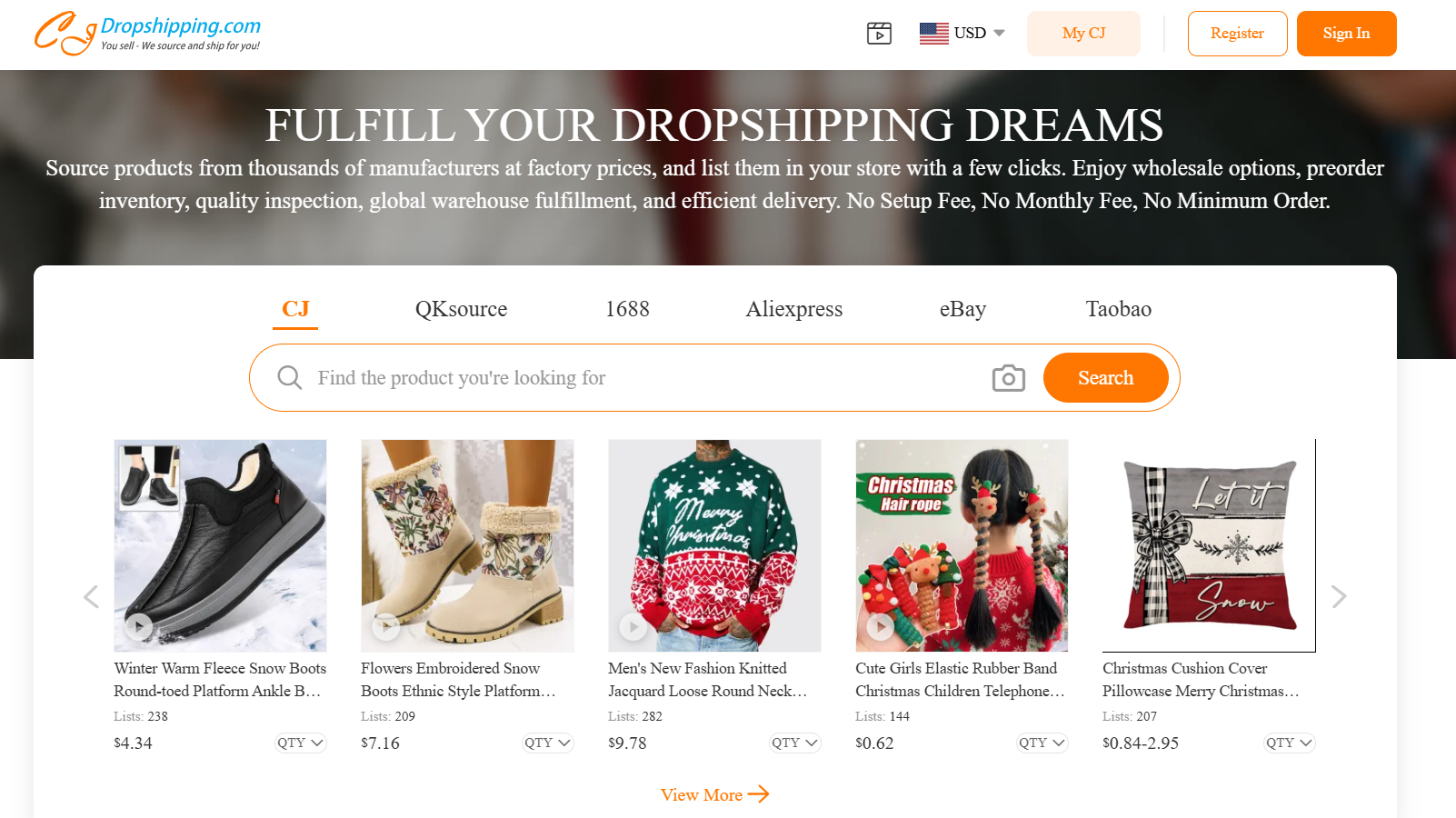
The company handles everything, including product sourcing, warehousing, and order fulfillment. Pricing varies by product. CJDropshipping charges fees for services like product photography and custom packaging. These costs are typically lower than market rates.
Key features:
- Product sourcing from Chinese markets
- Warehousing and fulfillment services
- Custom packaging options
- Product photography
| Pros | Cons |
| Low product prices | Limited product selection |
| No minimum order quantity | Longer shipping times |
| All-in-one dropshipping solution | Quality control issues possible |
10. Printful
Best for: Fast shipping (US, EU) | Custom products (print-on-demand)
Printful is a popular print-on-demand dropshipping supplier. It allows you to create and sell customizable items without holding inventory. The service offers a wide range of customizable products like t-shirts, hoodies, mugs, and posters. Pricing varies by product. For example, a basic t-shirt costs about $7-$15 to produce and ship. Printful charges no monthly fees but takes a cut of each sale.
Key features:
- Over 300 customizable products
- Integrations with major ecommerce platforms
- Mockup generator for product images
- Warehouses in multiple countries for faster shipping
| Pros | Cons |
| High-quality printing | Higher prices than some competitors |
| Easy-to-use platform | Limited product customization options |
| Fast shipping times | Can be slow during peak seasons |
| No MOQ |
11. Printify
Best for: Custom products (print-on-demand) | Automation & integration
Printify is a print-on-demand platform connecting you with suppliers for custom product creation. You can design and sell items like t-shirts, mugs, and phone cases without holding inventory. Pricing varies by product and supplier. Printify takes a 5% cut on the base price for free accounts. Premium accounts cost $29/month with no commission.
Key features:
- Large catalog of over 800 customizable products
- Network of 90+ print providers worldwide
- Integrations with major ecommerce platforms
- Mockup generator for product images
- Order tracking and fulfillment services
| Pros | Cons |
| Wide product selection | Quality can vary between suppliers |
| No upfront costs | Longer shipping times for some items |
| Easy-to-use design tools | Limited branding options on packaging |
| No MOQ |
12. Megagoods
Best for: Niche and specialty products | Low-cost & bulk ordering
Megagoods is a dropshipping supplier focused on consumer electronics and video games. They offer over 2,000 products in this niche, including digital cameras, televisions, and DVD players. The pricing structure at Megagoods includes a $1.50 fee per order. This low fee allows for efficient dropshipping to your customers without high upfront costs.
Key features of Megagoods:
- Specializes in consumer electronics
- No minimum order quantity
- Low per-order fee
- Ships to customers directly
| Pros | Cons |
| No minimum order quantity | Limited to electronics niche |
| Low per-order fee | Smaller product selection than some competitors |
| Specialized in electronics | May have higher product prices |
13. Dropified
Best for: Beginners | Automation & integration
Dropified is a dropshipping app designed to help you find products from different suppliers. It connects with popular ecommerce platforms like Shopify and WooCommerce. You can use Dropified to import items from Alibaba, AliExpress, and eBay.
The app lets you search for products and add them to your store with one click. It also automates order fulfillment, so you don’t have to manually place orders with suppliers. Dropified offers a 14-day free trial. From there, plans start at $27 per month.
Key features:
- One-click product importing
- Automated order fulfillment
- Price and inventory syncing
- Product customization tools
- Profit tracking
| Pros | Cons |
| Easy product importing | Can be pricey for new sellers |
| Automated order processing | Learning curve for some features |
| Works with multiple platforms | Reliance on AliExpress and eBay |

Create your online store in minutes!
Looking to sell online? Develop and launch your store with 10Web AI Ecommerce Website Builder.
Vetting a good dropshipping supplier step-by-step
It’s one thing to find suppliers for dropshipping, but are you ready to rely on them? To answer this question, follow these steps to vet suppliers effectively:
1. Check reviews and order samples
After learning how to find dropshipping suppliers, the next step is verifying a candidate’s reliability and product quality. First, see what other sellers have to say. Start by looking for reviews on platforms like Trustpilot, Google Reviews, and dropshipping forums. Be cautious with reviews hosted directly on the supplier’s website. They might be curated.
What to look for:
- Consistent quality: Check for mentions of product quality and consistency.
- Shipping speed: Look for feedback on delivery times.
- Customer service: See how suppliers handle issues and complaints.
- Patterns in reviews: A single bad review might be a fluke, but recurring issues are a red flag.
Next, always order samples to see the quality firsthand. Assess the materials, craftsmanship, packaging, and overall presentation. Make sure the product matches its online description.
2. Evaluate product quality
Product quality can make or break your reputation. Besides ordering samples, do a little extra research:
- Check certifications: Some suppliers provide quality certifications or lab results.
- Inspect product Listings: Reliable suppliers use high-quality images and clear, detailed descriptions.
- Compare samples: If possible, order from multiple suppliers to test quality and value.
3. Assess the shipping and fulfillment experience
Shipping is a thorn in the side for dropshippers. Customers expect fast and reliable shipping, but delays too often lead to refunds and bad reviews.
What to check:
- Shipping speed: How quickly do they process orders?
- Warehouse location: Are products stored close to your target market?
- Tracking options: Do they provide tracking numbers for every order?
- Inventory management: How do they handle out-of-stock items?
If possible, choose suppliers with warehouses closer to your main customer base for the fastest deliveries.
4. Test communication
How a supplier communicates with you before you start working together says a lot about how they’ll handle issues later. Reach out with a simple inquiry, like asking about their dropshipping terms or shipping options.
What to test:
- Response speed: Are they quick to reply, or do you have to wait days?
- Clarity: Do they answer your questions directly, or are their replies vague?
- Professionalism: Are they polite and informative, or dismissive and hurried?
5. Clarify dropshipping terms and agreements
Not every supplier is set up for dropshipping. To find the best dropshipping suppliers, make sure to ask the right questions upfront:
- Do you support dropshipping?
- What are the minimum order quantities (MOQs)?
- Can I brand the products or use custom packaging?
- What are your shipping options and average delivery times?
- Do you have a return and refund policy?
- Are there any fees for branding, restocking, or handling returns?
- Do you have restrictions on how sellers use product images?
6. Verify legal compliance and tax responsibilities
Legal and tax issues can catch you off guard if you’re not prepared. Make sure your supplier complies with local regulations and helps you navigate taxes and duties. Consulting a tax professional is the best way to confirm rules and responsibilities.
Key areas:
- Sales Tax: Depending on your location, you may need to collect sales tax.
- Import Duties: Some suppliers handle customs fees, while others leave it up to you.
- Dropshipping Agreements: A written contract outlining roles, quality expectations, and return policies can prevent disputes.
- Protect your business: Avoid products that could infringe on trademarks or copyrights.
7. Build a strong relationship
Vetting suppliers takes time, but it’s worth the effort. Once you find suppliers you trust, nurture those relationships. When suppliers feel valued, they’re more likely to go the extra mile to support your business.
Tips:
- Stay in touch: Regularly update them on your sales volume and potential increases.
- Be transparent: If you’re running a promotion, let them know ahead of time.
- Show appreciation: A simple thank-you message after a successful sale can make a big difference.
- Negotiate respectfully: Present your needs clearly and listen to their constraints.

Create your online store in minutes!
Looking to sell online? Develop and launch your store with 10Web AI Ecommerce Website Builder.
Avoiding common dropshipping mistakes
Learning how to find dropshipping suppliers can be exciting, but it’s easy to fall into some common traps when you’re just getting started with an online store. Avoiding these mistakes will save you time, money, and frustration.
Choosing suppliers based on price
Choosing the cheapest option might seem like a smart move, but it often leads to problems—like poor product quality, unreliable shipping, or bad customer support. Your customers will remember late deliveries and faulty items more than the few dollars you saved.
Prioritize quality and reliability. Choose suppliers with good reviews, consistent performance, and fast shipping—even if they cost a bit more. Always order samples to check quality before committing.
Lack of communication
One of the biggest mistakes beginners make is assuming all suppliers offer dropshipping. You might list a product, only to find out it’s discontinued or the supplier doesn’t even support dropshipping. That’s a recipe for unhappy customers.
Reach out to potential suppliers before adding their products. Confirm they offer dropshipping, ask about MOQs, and make sure you can use their product images. Open communication from the start builds a smoother partnership.
Relying solely on AliExpress
AliExpress is popular for beginners, but relying on it exclusively can backfire. Some suppliers are unreliable, and shipping can take weeks. Plus, if the product quality doesn’t match the listing, it could damage your store’s reputation.
Test every product before listing it. Order a sample to evaluate quality, packaging, and delivery speed. Also, diversify your suppliers by checking out platforms like Spocket or SaleHoo, or even sourcing directly. It helps if you have an easy-to-manage online store. You have more control over more than just appearance with your own website. AI tools for web development make it easier than ever for even non-technical people to start an ecommerce website.
Not having a backup plan
What if your main supplier suddenly runs out of stock or stops shipping? If you’ve already advertised the product, you’re stuck. This mistake can freeze your store’s operations and frustrate your customers.
Create a shortlist of backup suppliers for your best-selling products. This way, if your primary source fails, you can switch without major disruption. Vet these backups just as carefully as your main suppliers.
Where to go from here
Anyway, starting a dropshipping business doesn’t have to be complicated. With the right approach, you can successfully learn how to find dropshipping suppliers and build a solid ecommerce business that attracts the right customers for the best products.
Your next steps for dropshipping success:
- Test 1–2 platforms: Start by exploring reputable directories like Spocket or SaleHoo. Test a few suppliers before listing products in your store.
- Build a lean store: Keep it simple at first—focus on a niche and a few reliable products. Avoid overwhelming your customers with too many options.
- Reach out personally: Establish connections with suppliers early on. Building a professional relationship sets the foundation for smoother operations.
- Leverage AI tools: Use the 10Web AI Website Builder andWooCommerce to quickly create a professional, high-converting ecommerce site. Its AI-powered features make it easy to set up product pages, optimize layouts, and integrate essential plugins for your store.
With careful planning, reliable suppliers, and a user-friendly website builder, you can create a stand-out dropshipping business. Test your suppliers thoroughly, stay flexible, and keep learning from real-world experiences to grow your business successfully.
FAQ
Where can I find dropshipping suppliers?
What are the best platforms for dropshipping suppliers?
Are there free dropshipping supplier directories?
Which websites are best for finding suppliers?
How to choose a reliable dropshipping supplier?
What to look for in a dropshipping supplier?
How to verify dropshipping suppliers?
Can I find local dropshipping suppliers?
What are the top dropshipping suppliers in the USA?









